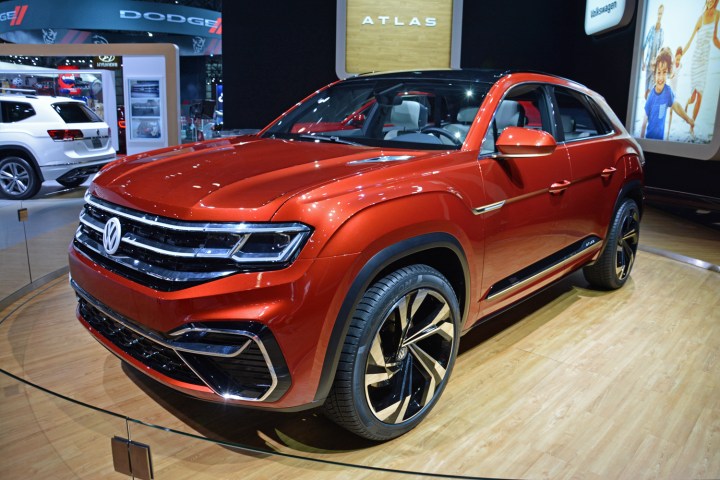
Volkswagen’s American division sells more SUVs and crossovers than ever before, a trend that reflects carbuyers’ ongoing shift toward high-riding models. In 2018, the Tiguan and the Atlas made up about 50 percent of VW’s sales. The brand expects that figure will keep growing as it continues to add SUVs and crossovers to its lineup over the coming years.
Volkswagen of America boss Scott Keogh told Digital Trends that a five-seat version of the Atlas will arrive during the first quarter of 2020. He stopped short of providing additional information about the car, but the German firm previewed it with the Atlas Cross Sport concept (pictured above) that it introduced at the 2018 New York Auto Show. When it arrives, the yet-unnamed model will compete in the same hotly contested segment as the born-again Honda Passport and the Jeep Grand Cherokee.
At the other end of the spectrum, Volkswagen is preparing a crossover positioned below the Tiguan, which got bigger as it entered its second generation. “We think there’s an opportunity for a vehicle there,” Keogh confirmed. Details are few and far between, and the model might not arrive until 2021. It will later be joined by an electric crossover inspired by the ID Crozz concept. The two models will compete in the same segment size-wise, but they won’t share any major components.
Although SUVs are hogging the spotlight, Volkswagen won’t give up on the sedan market. It released a new Jetta in 2018 and unveiled a heavily revised Passat in 2019. “It would be silly to walk away from that business,” Keogh added.
Volkswagen’s lineup is changing, and the way motorists get behind the wheel of one of its cars will evolve as well. The company is actively looking at distributing its vehicles through a subscription service that could take on one of two different forms. The first option would look a lot like Care By Volvo, a program that bundles a car payment, maintenance, and insurance into one flat monthly fee. The second option would give subscribers access to a pool of different cars and let them change vehicles as needed. For example, they could conceivably commute in a Golf GTI during the week, and hop in an Atlas for a weekend getaway.
“Absolutely, it’s something I can imagine,” Keogh said when we asked for his position on subscription services. “I think there’s an opportunity in both of those camps. As you look at a lot of different businesses, from Netflix to Spotify, customers are very used to the concept of subscription. The thing you have to watch is that, unlike a rerun of Gilligan’s Island on Netflix, which is not a depreciating asset, a car is. That’s something that needs to be looked at.” It’s easier for a luxury automaker, like Audi, to start a subscription service than it is for a mainstream brand.
Keogh didn’t announce when Volkswagen will announce how it plans to enter the growing subscription market, but he hinted it’s something the brand will do sooner or later. “I think it’s going to be expected moving forward,” he said.
Editors' Recommendations
- Here’s how Volkswagen plans to electrify America’s most popular car segment
- Sharp and tech-savvy, the Volkswagen Golf gets a full digital reboot
- Volkswagen’s dapper 2020 Cross Sport may make its big brother jealous
- Volkswagen makes it easier for customers to talk to their car via their phone
- For Volkswagen, the electric ID.3 is more than a new car. It’s a new chapter



